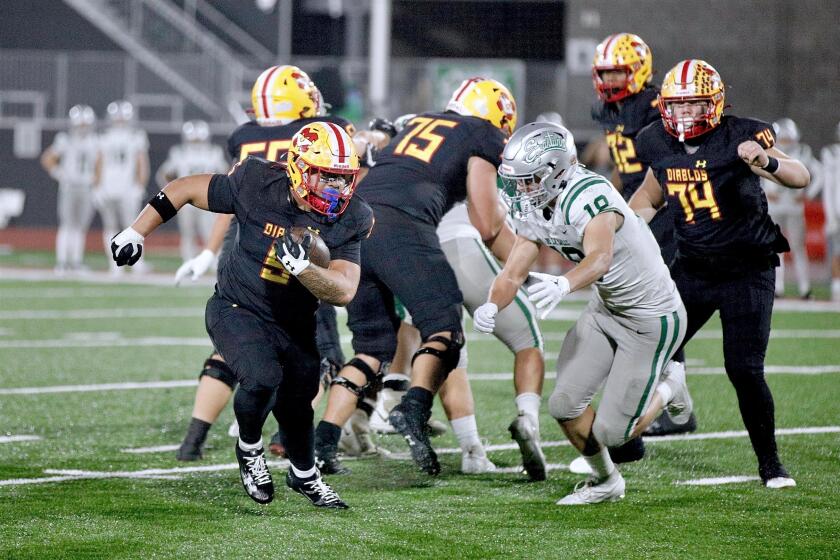Entertainment Merger Mania : SPORTS BUSINESS : Will Disney Hit a Homer or Whiff ? : Programming: Analysts say the merger may enhance its ability to package events. But some teams are already wary.
If the importance of sports in the entertainment business needed underlining, it came in Walt Disney Co. Chairman Michael Eisner’s repeated references to ESPN on Monday in his statements about Disney’s $19-billion acquisition of Capital Cities/ABC Inc.
Analysts say that one result of the combination may be the merged company’s enhanced ability to package the sports programming of ESPN--Capital Cities’ 80%-owned cable-TV sports network--with Disney’s own sports and entertainment offerings.
This is particularly true abroad, where analysts think there is a major opportunity to promote American sports.
“If you look around the world, there’s been a tremendous explosion in new private TV stations and a tremendous demand for new programming,” said John Mansell, an analyst with Paul Kagan Associates.
To the extent that Disney can broaden its base of offerings to tap that demand, he said, it may get a leg up on an undeveloped but potentially huge global market for sports programming.
Eisner, at the news conference announcing the deal, mentioned the potential of markets such as India and China, and said that he expects to market ESPN and its cable-TV cousin, the Disney Channel, together in foreign countries.
Observers also expect Disney--which already owns pro hockey’s Anaheim Mighty Ducks and is buying a 25% stake in baseball’s California Angels--to keep pushing for franchises in the National Basketball Assn. and the National Football League.
The NFL, historically wary of corporate-owned franchises, was cool to Disney’s advances this spring, after the Rams and Raiders had fled Southern California for St. Louis and Oakland, respectively.
But the NFL, unlike Major League Baseball, has been aggressively trying to sell itself abroad, through the Europe-based World League of American Football. If linking up with an even bigger version of marketing dynamo Disney can further the effort to penetrate foreign markets, team owners may give the Mouse Factory another hearing.
“Disney has enough clout and good image to be taken seriously [by the NFL] if its offer is right,” said Barry Frank, a broadcast executive International Management Group, the powerhouse sports agency.
Baseball, with its tremendous popularity in Latin America and Japan, has “the single best opportunity of all American sports to go international, and so far they’ve blown it,” said Roger Noll, a Stanford University economist who studies pro sports.
Eisner and Disney might offer the sport another chance to exploit its obvious advantages abroad, but don’t count on it, Noll said.
Baseball has a history of turning its back on innovators such as Bill Veeck, the legendary promoter who owned the Cleveland Indians and other teams but was despised by fellow owners for his flamboyance.
“Show a little enterprise and imagination and they drum you out of the club,” Noll said.
Among entertainment and media companies, Disney was by no means first on the sports scene. Turner Broadcasting System Inc. used its WTBS cable-TV “superstation” to help vault its Atlanta Braves baseball team to national prominence. Turner also owns the NBA Hawks and has helped develop international sporting events like the Goodwill Games for the express purpose of turning them into TV properties.
Tribune Co., through its Chicago superstation WGN, has done similar spade work for baseball’s Chicago Cubs, which it owns, and Chicago White Sox, which it does not.
Paramount Communications Co., before selling out to Viacom Inc., owned New York’s basketball Knicks and hockey Rangers. The teams now belong to ITT Sheraton, the hotel chain that increasingly styles itself as an entertainment firm.
Satellite-TV’s Comsat Corp. owns the NBA’s Denver Nuggets and just bought the National Hockey League’s Quebec Nordiques.
Those aren’t the only examples.
For those worried that Disney might somehow use its network ownership to give a Disney team preferential treatment on ABC’s Monday Night Football, say, New York-based sports consultant Martin E. Blackman says that similar conflicts already exist for networks that produce their own TV shows.
No network would jeopardize its ratings position to try to boost a program that could not succeed on its own, he said, and the same goes for sports: You don’t feature a last-place team just because the network’s parent owns it.
More to Read
Go beyond the scoreboard
Get the latest on L.A.'s teams in the daily Sports Report newsletter.
You may occasionally receive promotional content from the Los Angeles Times.










